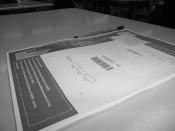Barriers Encountered when Beginning Reading and Strategies Employed to Provide Meaningful Support or InterventionGood reading ability is the key to success in school and this is one reason why researchers are trying to find significant educational and psychological variables that can explain variations in reading ability and academic achievement. These variables can be strictly cognitive like word recognition, or they can be more socially cognitive. Reading and learning to read are in part cultural activities and occur in a cultural context, which means that the home environment is crucial when it comes to developing literacy.
Children who grow up in homes with many books and where the parents spend a lot of time on reading and writing very seldom develop problems with literacy in school. Parents' attitudes and thoughts about literacy are of great importance in children's literary development and children are influenced by the way in which literacy is used within the family.
By living in and participating in an environment where others use literacy the child develops an understanding for the meaning and function of signs. Researchers have concluded, from different assessments of literacy (e.g. IEA), that the single most important factor for predicting reading ability is the number of books in the household. Demographic data also show that a majority of reading problems fall upon children from poor families with little education i.e., families with low socio-economic status (SES) who do not spend a lot of time on reading activities. A recent large-scale study, Programme for International Student Assessment (PISA) has shown that there are considerable differences in reading ability between students from high SES and student from low SES homes. (Swalander & Taube, 2006)Attitudes are generally influenced by people around us. Parents and teachers who enjoy reading tend to pass these attitudes on to children...


